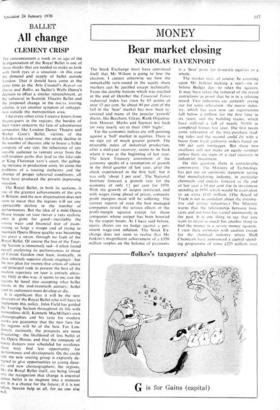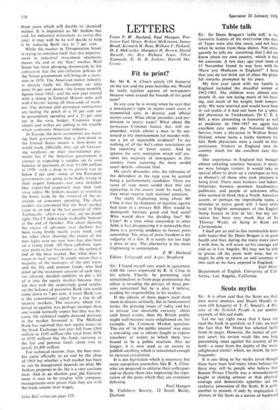MONEY Bear market closing
NICHOLAS DAVENPORT
The Stock Exchange must have convinced itself that Mr Wilson is going to lose the election. I cannot otherwise see how the remarkable turn-round in the equity share markets can be justified except technically. From the double bottom which was reached at the end of October the Financial Times industrial index has risen by 63 points or over 15 per cent. So about 40 per cent of the fall in the 'bear' market has now been re- covered and many of the popular 'growth' shares, like Beecham, Glaxo, Rank Organisa- tion, Hoover, Marks and Spencer are back (or very nearly so) to their 1969 'highs'.
Yet the economic indices are still pointing against a 'bull' market in equities. There is no sign yet of much greater growth. The miserable index of industrial production, after a mid-year recovery, seems to be back where it was at the beginning of last year. The latest Treasury assessment of the economy speaks of a resumption of growth in the third quarter of last year. after the check experienced in the first half, but it was only 'about per cent'. The National Institute forecast a growth rate for the economy of only 11 per cent for 1970. With the growth of output restricted, and with wages rising ahead of prices, company profit margins must still be suffering. The current reports of even the best managed companies reveal the serious effects of the profit-margin squeeze except for those companies whose output has been boosted by the export boom. As I have said before, equity shares are no hedge against a per- sistent wage-cost inflation. The Stock Ex- change does not seem to realise that Mr Jenkins's magnificent achievement of a £350 million surplus on the balance of payments is a 'bear' point for domestic equities as a whole.
The market may. of course, be counting upon Mr Jenkins making a start—on or before Budget day—to relax the squeeze. It may have taken the removal of the travel restrictions as proof that he is in a relaxing mood. Two industries are certainly crying out for some relaxation— the motor indus- try, which has seen new car registrations fall below a million for the first time in six years. and the building trades, which have suffered a fall of nearly 50.000 in completed houses last year. The first needs some relaxation of the hire-purchase trad- ing rules and the second could do with a boost from local authority orders based on 100 per cent mortgages. But these two swallows will not make an equity summer unless there are signs of a real recovery in industrial investment.
On this question there is considerable controversy. "I he Ministry of Technology has put out an optimistic statement saying that manufacturing industry, in particular chemicals and metals. forecast at the end of last year a 10 per cent rise in investment spending in 1970. which would be equivalent to an extra £14.4 million. (The Board of Trade is not so confident about the distribu- tive and service industries.) The Ministry warns that the relationship between fore- casts and out-turn has varied enormously in the past. It is one thing to say that you want to invest so much but another thing to find the money in a severe money squeeze. I view these estimates with caution except for the chemical industry where Shell Chemicals have announced a capital spend- ing programme of some £225 million over
ffolkees taxpayers' alphabet
G is for Gains (capital)
three years which will double its chemical output. It is important as Mr Jenkins has said, for industrial investment, to revive this year; it may well be he will decide to help it by reducing Bank rate to 7 per cent.
While the market in Throgmorton Street is trying to convince itself that this improve- ment in industrial investment intentions means the end of the 'bear' market, Wall Street has been plunging downwards in the conviction that the anti-inflation policies of the Nixon government will bring on a reces- sion in 1970. The American motor industry is already badly hit. December car sales were 10 per cent down—the lowest monthly figures since 1962—and the new year started with a slump in General Motors sales and with Chrysler laying off thousands of work- ers. The defence and aerospace contractors are feeling the pinch of a 10 per cent cut in government spending and a 25 per cent
cut in the NASA budget. Excessive wage claims and strikes are adding to the trouble which confronts American industry.
In Europe the OEEC economists are warn- ing their governments that a slow-down in
the United States means a slow-down in world trade. Officially they are all forecast- ing surpluses on their international pay- ments but if the American government is correct in expecting a surplus on its own balance of payments of over $1,000 million in 1970--with a drop in its growth rate to below 2 per cent—some of the European governments are going to be badly wrong in their export forecasts—our own included.
Our export-led expansion may then fade away unless Mr Jenkins decides to stimulate the home trade by the removal of the re- straints on consumer spending. The chart readers are convinced that the 'bear' market came to an end in the last quarter of 1969.
Technically—chart-wise—they are no doubt right. The FT index made its double 'bottom'
at the end of October. The chart showing the excess of advances over declines has been rising firmly nearly every week, and the other chart showing the excess of net new highs over net new lows has also been on a rising trend. All these cabalistic signs may point to last November as the technical end of the bear market. But what does it mean in 'real' terms? It simply means that a majority of the managers of the unit trusts and the life and pension funds, who had piled up the maximum amount of cash they are allowed, decided suddenly to put a lot of it into the equity market because they felt that with the surprisingly good surplus on the balance of payments Bank rate could come down to 7 per cent. A lower Bank rate is the conventional signal for a rise in all security markets. The recovery which fol- lowed in equities was perhaps stronger than one would normally expect but that was be- cause the technical supply-demand position in the market favoured it. The Midland Bank has reported that new equity issues on the Stock Exchange last year fell from £364 million to f195 million (the total from £676 to £592 million) but the funds accruing to the life and pension funds alone rose to nearly £1,400 million.
For technical reasons. then, the bear mar- ket came officially to an end by the close of 1969 but whether a bull market has been or can be inaugurated depends on what Mr Jenkins proposes to do. He is a very cautious man. And in an election year ithe Govern- ment is sure to be tougher with company managements over prices than they are with the trade unions over wages, John Bull writes on page 125.







































 Previous page
Previous page